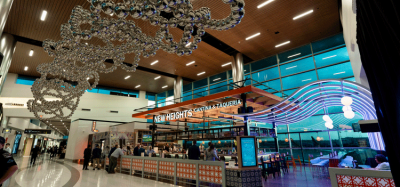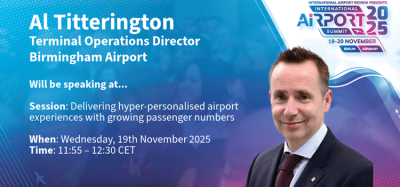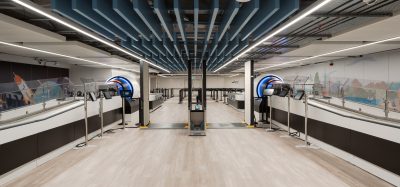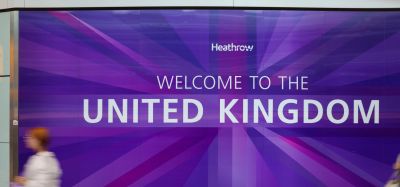Talking Istanbul Airports’ socially conscious operations with CEO Kadri Samsunlu
- Like
- Digg
- Del
- Tumblr
- VKontakte
- Buffer
- Love This
- Odnoklassniki
- Meneame
- Blogger
- Amazon
- Yahoo Mail
- Gmail
- AOL
- Newsvine
- HackerNews
- Evernote
- MySpace
- Mail.ru
- Viadeo
- Line
- Comments
- Yummly
- SMS
- Viber
- Telegram
- Subscribe
- Skype
- Facebook Messenger
- Kakao
- LiveJournal
- Yammer
- Edgar
- Fintel
- Mix
- Instapaper
- Copy Link
Posted: 17 April 2023 | International Airport Review | No comments yet
Kadri Samsunlu, Chief Executive officer of iGA Istanbul Airport speaks with International Airport Review’s Holly Miles about their airport experience and how they are the first airport in the world to achieve the ACI World Accessibility Accreditation.
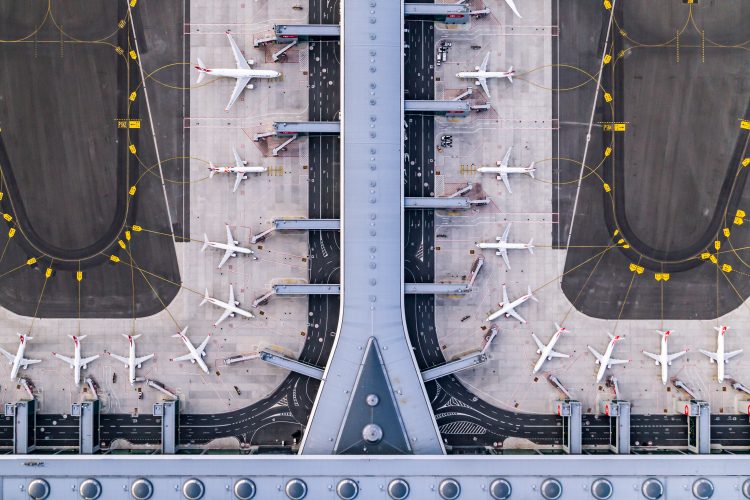

Credit: İGA İstanbul Airport
Kadri Samsunlu, Chief Executive officer of iGA Istanbul Airport speaks with International Airport Review’s Editor Holly Miles.
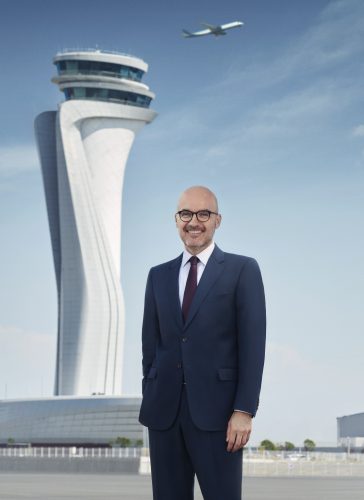

How are you working to create a seamless, efficient and enjoyable experience for your passengers?
Our customers are at the very core of everything we do at iGA Istanbul Airport. We are a young company, established five years ago, and we are striving to build certain cultures into all aspects of our work.
To be able to achieve good passenger experience at airports, you need to have three Ps – people, premise, processes. If you are good at these three Ps, then the seamless, efficient and enjoyable experience will come naturally.
We provide continuous training for our staff. They develop knowledge and information about our facility, about our processes and about our workforce. At the core of our culture is the belief that the better prepared our staff are, the less uncertainty there is in the minds of our passengers. Another important feature or characteristic for our workforce that we try to build is having the right attitude when they meet with passengers. In a service business, positive interaction between staff and passengers reduces anxiety and stress, and the right attitude, by which I mean having empathy, kindness, a courtesy smile for our passengers, should not be underrated. Our staff are key in connecting with passengers and creating a positive memorable experience.
Providing a seamless experience is vital to all airports and that’s the culture we have been working on very intensively inside iGA, as well as aligning all our operational stakeholders when it comes to handling passengers. Our proposition is simple: spending less time standing in line and reducing the pinch points at the airport. This means that we have to increase efficiency and reduce stress. Less time spent waiting in line means less stress at the airport and in turn means more dwelling time for passengers to enjoy our products and premises. A seamless customer experience requires all these components working in harmony.
Recruiting and retaining a talented and skilled workforce is something that the aviation industry struggled with even prior to the pandemic. How is iGA enticing people to work within the airport and how are you investing in your workforce so that you can keep them engaged?
To provide the best service, you need to have the best workforce available in your country or ecosystem.
To be able to retain and attract the talent, you need to focus on two groups. The first is your existing workforce. As I said, iGA is a young company. That said, many of our employees have extensive experience in the sector or in various other industries. We continuously invest in training and providing education, enabling us to nurture talent. To do this, we have the iGA Academy, the education arm of our company, which is currently offering training via 6,000 different options.
We also develop internal trainers due to our large workforce; we currently have around 9,000 employees under the iGA umbrella, and with our subcontractors, that figure increases to approximately 15,000. Hence, we cannot just rely on external resources. This is why we build up internal trainers who are experts in their fields. This approach is both cost and time efficient.
With iGA Academy, we also focus on benefiting from the experience of our external stakeholders such as ACI or IATA. With their regional training centres, we are offering the most competent aviation professional training, not only for our employees, but for all airports in the world. In 2022, we began carrying out these training courses at our airport to develop our existing human resource. We are in close discussions with international aviation authorities like ICAO, like ACI, for global exchange programmes, and in addition we are exchanging staff with our sister airports all around the world.
We are also encouraging our staff to undertake master’s degree in Turkey in subjects they want to focus on. We receive special rates from the various universities in Turkey and most online courses. In addition to this, we wish to develop our staff professionally, encouraging them to stay with our company for a long time. Providing career opportunities, planning for our staff, so that they wish to stay at iGA and in the industry, is of benefit to us all.
We very much believe in diversity and inclusion. Through diversity and inclusion, we integrate different cultures, different backgrounds, different ways of thinking and abilities in Turkey and outside of Turkey. When we blend all these values and the workforce underneath the iGA umbrella, we create a much stronger working group culture.
We have to acknowledge that, in the pandemic, our industry didn’t treat its employees properly. The image perceived is that the industry short-sightedly laid off its staff with little effort to retain them. Consequently, new employees are no longer as trusting of our industry. This, coupled with an already demanding job environment that’s 24/7 (and employees expected to work weekends and shifts) it can dampen the appeal of working in the aviation sector.
Therefore, we need to be more proactive in our recruitment strategy going forward – and this forms our second group to focus on. We need to build talent pools, we need to attract volunteers who will come and experience our industry and our business, so when they seek a full-time job, they will be knocking our door. We need to bring in more trainees or students in the universities through internship programmes so that they have a better understanding of who we are, what we do, and crucially why the industry is still very appealing for newcomers or employees in the initial years of their career. For instance, last year we brought over 1,000 university students undertaking internship programmes to Istanbul Airport. They left this experience with very positive views about us, about the business, about the industry. So, hopefully when we need new young talent joining us in the future, they will be looking to take positions with us.
More importantly, to be competitive in your business, you also have to give your employees a good experience. Passenger experience is key, but employee experience is equally important. When staff feel recognised in their success, are cared for in direct circumstances, when the company is there to open doors for talent development, when the work staff deliver is objectively reviewed and feedback is provided, I can assure you that our employees continue to be proud of working for iGA and the industry, and thus will have no reason to seek another opportunity elsewhere. This is how we retain our workforce.
Huge congratulations on being the first airport in the world to achieve the ACI World Accessibility Accreditation. Talk me through the philosophy behind this and why it is important to you.
Travelling is a human right and as an infrastructure provider of transportation, we are obliged to provide an accessible and inclusive transportation possibility or experience to everybody. No-one should be hindered or prevented from travel due to being disabled, having reduced mobility, or indeed any accessibility issue. As infrastructure providers, airports should be making it possible for everybody to travel and should allow it to be done so independently. Accessibility and design at every touchpoint to make independent travel a reality is key and that’s what we have been doing at Istanbul Airport from day one.
Accessibility is not achieved by, or solely the responsibility of, an infrastructure provider like our airport. We have to bring stakeholders with the same mindset and objective to the table. With an aligned strategy, we have to guarantee providing an equal, respectful and professional approach to access to our services. Once this is achieved, there is an exceptional environment already available for building an inclusive culture in your airport.
I will not be humble here; we have been very successful. We put together an iGA care solution, where video call centre digital information kiosks are available 24/7 which enable people using sign language to gain the right information.
All passengers have the right to know what is available at the airport, particularly services for their own individual needs, and they should also be told how to get from one location to another. Our special passenger service points, very special guest rooms, food corners for special guests providing a silent and stress-free environment for people who have sensitivities to crowd and noise, are also availed under iGA care solutions. We cannot expect autistic passengers to sit in a crowded waiting area for hours. That’s why we created, at various corners of the terminal, very special guest rooms where they can wait without any hustle or noise, for themselves or for their families to catch their flights.
We are very proud to have opened a new Grab-and-Go Coffee café in the domestic concourse of the terminal. This is being run by nine employees, all of whom have disabilities. All profits from the café are being used for socially responsible projects. We hope to bring this set up to the international side of the concourse as well in the future.
We benchmark with feedback we receive from the experienced associations in specific disability areas. We are also hiring ghost passengers, who are people with disabilities, who come and use our facility and provide their input. But we shouldn’t forget that travelling has two sides, a departure city and an arrival city. We know what we do, but it’s also important to keep an eye on what the arrival city airport is providing for our departed passengers.
I am the voice of accessibility actions we take in this airport and I have a personal reason for doing so; one of my daughters is autistic. Before becoming the CEO of this airport, I had a lot of experience travelling with my daughter flying from Turkey to Europe on to the U.S. I feel this first-hand experience and information is an advantage, and I am proud of how my team are working to increase awareness about accessibility in Turkey and as much as we can all around the world.
What does social responsibility mean to you?
From iGA’s perspective, social responsibility means reducing inequality in the areas of education, health, and services that the general public are using. Within this scope, we are trying to touch local communities, those living close to our airport, and individuals with disabilities.
As I just mentioned, I am deeply passionate about this. I have a special team of four people whose work is solely dedicated to the experience of individuals with disabilities at the airport.
As a part of social responsibility projects, we also focus on women. Specifically, we try to increase women’s contributions to their household incomes through a project where they make products that are sellable at the airport. We started with women living in Bursa, which is a city two hours from Istanbul, who are making handmade toys. We are paying all their expenses and selling those toys in our duty free stores and sending them all around the world. The income of this work is directly given to the women who are making those toys.
We are also providing support to the children and young people in our community. This is not limited solely to children or young people in Turkey with disabilities. This includes regular children and young people who are experiencing different issues and problems with integrating into society.
Big corporations like iGA should be the front-end fighters for socially responsible projects like these because we have big budgets and we can allocate some sizable chunks from those. This is true for relatively mid-to-small size companies as well. The business world of Turkey has the potential to touch many segments of our society who need support through socially responsible projects.
Another advantage for iGA comes from involving our employees in our projects. This heart-to-heart journey, which we began last year, has already seen our employees giving something back. I’m proud and amazed of the eagerness of our own staff who have been allocating their free time and sharing their personalities with the segments of societies in need of this touch.
What sustainability initiatives are you most proud of?
We acknowledge climate change is a reality. Undoubtedly, it is the biggest challenge of our time.
For us as an airport, we have already committed to net zero carbon emissions by 2050, but we will reach this milestone much earlier. I cannot name you the year, but we will do so because as an airport with the newest infrastructure in the world, we are not a big carbon emission entity.
However, the users of this airport – the airlines and the aircraft – create significant carbon emissions, which need to be reduced. While we can’t do that on their behalf, what we can do as the airport operator, is promise sustainable operations. We have signed the first airport collaborative decision-making agreement in Turkey, U.S., Turkish airline and DHMI. Together, we will be minimising delays and increasing operational efficiency and safety at Istanbul Airport. This was a big achievement for my country, signing this ACDM among these three entities, but it is binding for every stakeholder working inside our airport. Therefore, whatever we do as the three big components of the operations at Istanbul Airport will be also accepted and implemented into the processes of our stakeholders.
We want to be using our infrastructure efficiently. End-to-end taxiway and parallel taxiway operations are currently being run in our airport with the A-SMGCS routing service that is in place. This enables us to run landing aircraft through the shortest taxi operations route possible. Use of technology such as this is key to us continually minimising taxi times and reducing emissions in Istanbul.
For the NSP, the HMI in our case, they must be effectively managing the traffic in the air. This means preventing airlines from unnecessarily circling the airport during landing and polluting avoidable emissions.
Another way we are making a difference is by creating a carbon sink, which means reducing the carbon footprints of our total emissions. With our minister of environment, we are planting millions of trees upon 5,000 hectares of land in Turkey, which will be completed in 10 years’ time. Since our opening, more than 200,000 trees have been planted.
What is your future vision for the airport?
Our vision for our airport remains unchanged since we commenced our operations. Istanbul’s new airport is the biggest infrastructure investment ever seen in Turkey, and infrastructure investments are done to create value and wealth for the country as well as for the industry. Our airport and the ecosystem around it is going to contribute around 5% to the GMP of Turkey, with Istanbul Airport at the heart of the new economic centre which is currently being developing in this part of the city.
Secondly, we will remain ambitious and continue to grow in line with passenger growth and cargo demand. This airport is going to complete the upcoming three phases of investments. We will be making Istanbul Airport one of the most important travel centres. This is a strong statement, but it reflects the commitment of our government to make Turkey one of the key players of aviation industry.
Lastly, my vision for the business is to always be focused on our passengers. We will continue putting passenger comfort, convenience, and connectivity at the very core of this airport.
What are the challenges you are facing this year?
I’m extremely disappointed by the reaction of certain countries to the opening of China. China is the most important market for the industry. If Asia recovered only 60% last year, it is simply because China was closed for so many months. China finally decided to open its border and what was the reaction of the world? Confusing health procedures introduced simply to discourage people to travel. We have experienced so much confusion throughout this pandemic. Regulation such as these are not how recovery will come in 2023. I hope the walls for access into China will be eliminated very soon.
I would say the second challenge for Istanbul is the on-time performance of Europe, which statistically at the big airports is extremely poor. The reason for this is the scarcity of human resources in Grantland Link and security in big markets. But at the same time, the industry recovered so fast last year. I think availability of crew has been also an issue. We hope that working very closely with Turkish Airlines this year will enable us to improve the on-time performance of our airport.
The third concern is that we have a very strong hop carrier in Turkish Airlines. They are ambitious for growth, but if the delivery of the aircraft is delayed, it could be constrained.
What opportunities do you foresee that you would like to capitalise on?
I’m happy that our CAPEX is complete. Certainly, demand is back, and we are fortunate to be working at very low-capacity utilisation. On our busiest day in 2022, we were working at only 50% capacity.
Our distinct advantage is our infrastructure and superstructure. Since we are the newest airport in the world, neither our infrastructure nor superstructure requires upgrading, giving us a competitive edge over the other hubs in the world.
As I mentioned earlier, Turkish Airlines as a very strong hop carrier, are naturally and extremely ambitious for growth. We intend to capitalise on this and grow our transfer traffic going forward.
Lastly, my city of Istanbul is the biggest brand of the country. Every passing year, it is increasingly becoming a P2P destination. Last year, 15 million tourists came to Istanbul – that’s even more than in 2019. Going forward, we’ll be extremely happy hosting the new P2P passengers coming to Istanbul, and that’s going to be our main focus as an airport operator to European countries and for long haul destinations.


Prior to his position as Chairman of the Executive Board of iGA Istanbul Airport, which started in September 2017, Kadri Samsunlu gained experience as a general manager and executive board member in several investment companies between 1995 and 2006. From 2006, he worked as an investment and corporate finance advisor in Romania and Türkiye for 3 years. Samsunlu, who served as the Deputy General Manager in charge of Financial Affairs at AKFEN Holding between 2008 and 2017, and as a member of the board of directors in holding subsidiaries, later joined iGA Istanbul Airport.
Throughout his career as CEO, he has consistently improved the passenger experience and operational excellence at iGA Istanbul Airport. Under his leadership, iGA Istanbul Airport has become a reference value in terms of durability among global hubs and it has become a symbol of sustainability, digitization and commitment to accessibility under all circumstances.
Samsunlu was elected as an Executive Board member at Airports Council International ACI Europe in 2021 and ACI World in 2022.
Related topics
Airport cities, Airport development, Equity, Diversity & Inclusion (EDI), Passenger experience and seamless travel, Passengers with reduced mobility (PRMs), Social responsibility, Workforce
Related airports
Related airlines
Related organisations
ACI World, iGA Academy, International Air Transport Association (IATA)




